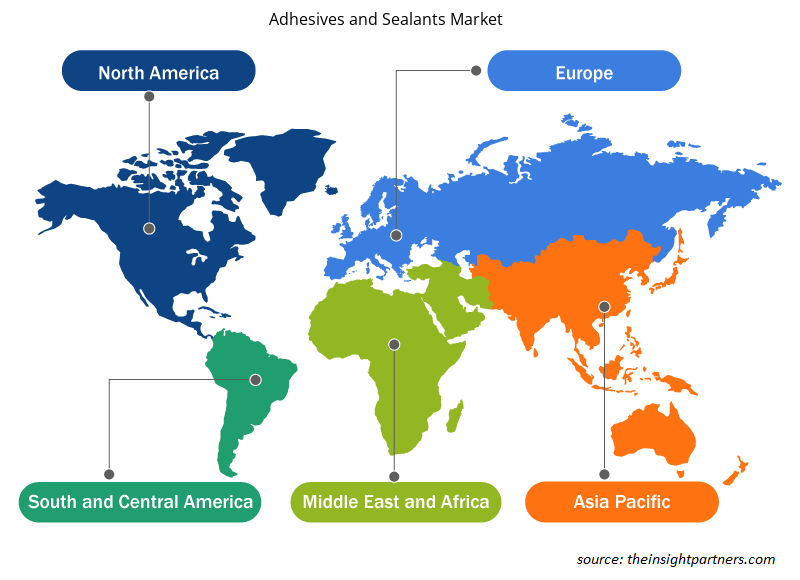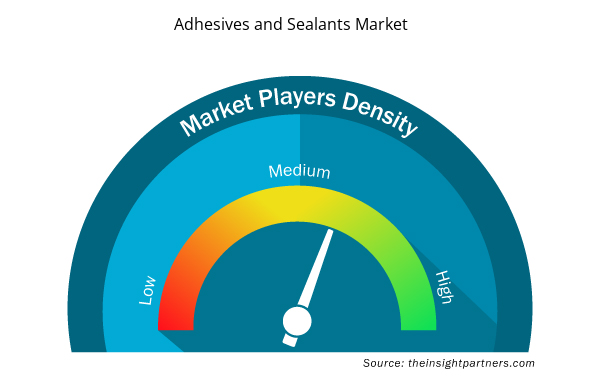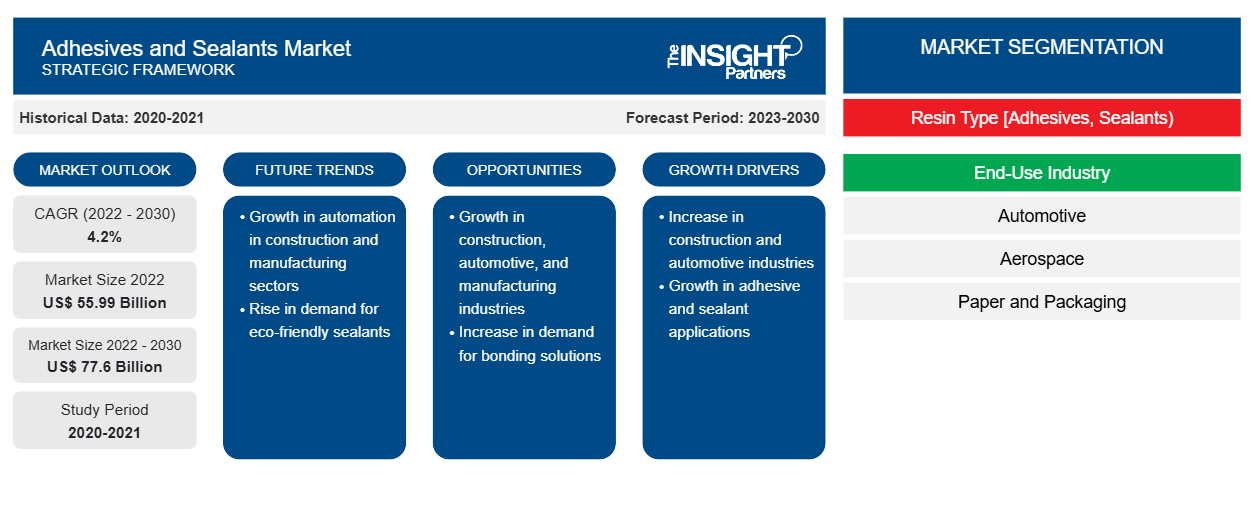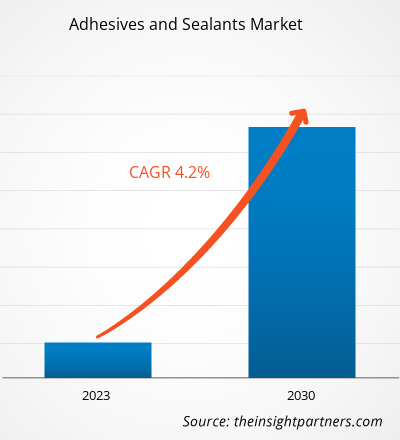[Forschungsbericht] Der Markt für Klebstoffe und Dichtstoffe hatte im Jahr 2022 einen Wert von 55.986,03 Millionen US-Dollar und soll bis 2030 77.598,29 Millionen US-Dollar erreichen; von 2022 bis 2030 wird eine durchschnittliche jährliche Wachstumsrate (CAGR) von 4,2 % erwartet.
MARKTANALYSE
Klebstoffe werden verwendet, um eine feste Verbindung zwischen zwei Oberflächen herzustellen, während Dichtungsmittel verwendet werden, um Lücken zu füllen oder abzudichten und so die Bewegung von Flüssigkeiten einzuschränken. Klebstoffe und Dichtungsmittel werden hauptsächlich in der Baubranche, der Automobilindustrie, der Luft- und Raumfahrt, der Papier- und Verpackungsindustrie, der Holzverarbeitung sowie der Elektro- und Elektronikindustrie eingesetzt. Epoxidklebstoffe haben eine hohe Zugfestigkeit und haften gut an Metallen. Epoxid- und Acrylklebstoffe werden auch zum Verkleben von Glasoberflächen verwendet, bieten jedoch keine gute Ästhetik. Dichtungsmittel sind je nach spezifischer Anwendung in verschiedenen Arten erhältlich, wobei Silikondichtmittel, Urethandichtmittel und Acryldichtmittel weit verbreitet sind.
WACHSTUMSTREIBER UND HERAUSFORDERUNGEN
Das starke Wachstum der Bau- und Automobilindustrie sowie die steigende Nachfrage nach Klebstoffen und Dichtstoffen aus der Papier- und Verpackungsindustrie sind die Faktoren, die den Klebstoff- und Dichtstoffmarkt antreiben. Der Ausbau der Infrastruktur umfasst Projekte im Zusammenhang mit Straßen, Häfen, Eisenbahnen, Flughäfen und industrieller Infrastruktur. Steigende Bautätigkeiten in vielen Ländern, darunter den USA, China, Indien und Saudi-Arabien, schaffen im Prognosezeitraum lukrative Möglichkeiten für den Klebstoff- und Dichtstoffmarkt . Laut einem Bericht des Verbands der europäischen Automobilhersteller stieg die Kraftfahrzeugproduktion von 2020 bis 2021 weltweit um 1,3 %; im Jahr 2021 wurden weltweit insgesamt 79,1 Millionen Kraftfahrzeuge, darunter 61,6 Millionen Personenkraftwagen, produziert. Laut einem Bericht des Bureau of Transportation Statistics ist China einer der dominierenden Märkte für die Herstellung von Personenkraftwagen und Nutzfahrzeugen. In der Automobilindustrie bieten Klebstoffe und Dichtstoffe Lösungen zum Verkleben von Innen- oder Außenkomponenten von Autos. Daher stärkt das starke Wachstum der Automobilindustrie in verschiedenen Ländern auf der ganzen Welt die Nachfrage nach Klebstoffen und Dichtstoffen. Die steigende Vorliebe der Verbraucher für verpackte Lebensmittel führt zu einer Nachfrage nach hochwertigen Lebensmittelverpackungen, die Lebensmittel länger frisch halten können. Darüber hinaus ist der Online-Einzelhandel in den letzten Jahren stetig gewachsen. Die E-Commerce-Branche wächst in vielen Ländern, was sich positiv auf die Nachfrage nach verschiedenen Verpackungsprodukten auswirkt. Die Volatilität der Preise für Rohstoffe, die bei der Herstellung von Klebstoffen und Dichtstoffen verwendet werden, stellt eine Herausforderung für den Klebstoff- und Dichtstoffmarkt dar. Der Anstieg der Rohölpreise aufgrund schwankender globaler Wirtschaftsbedingungen treibt den Preis für Erdölharze weiter in die Höhe. Im Jahr 2022 meldete die DIC Corporation aufgrund gestiegener Rohstoffpreise und einer Lücke zwischen Angebot und Nachfrage überarbeitete Verkaufspreise für Epoxidharze und Epoxidharzhärter. Der Anstieg der Rohstoffpreise führt zu einer Belastung der Produktrentabilität und der Margen. Daher bremsen Schwankungen der Rohstoffpreise das Wachstum des Klebstoff- und Dichtstoffmarktes.
Passen Sie diesen Bericht Ihren Anforderungen an
Sie erhalten kostenlos individuelle Anpassungen an jedem Bericht, einschließlich Teilen dieses Berichts oder einer Analyse auf Länderebene, eines Excel-Datenpakets sowie tolle Angebote und Rabatte für Start-ups und Universitäten.
- Holen Sie sich die wichtigsten Markttrends aus diesem Bericht.Dieses KOSTENLOSE Beispiel umfasst eine Datenanalyse von Markttrends bis hin zu Schätzungen und Prognosen.
SEGMENTIERUNG UND UMFANG DES BERICHTS
Die „Globale Marktanalyse für Klebstoffe und Dichtstoffe bis 2030“ ist eine spezialisierte und eingehende Studie mit einem Schwerpunkt auf globalen Markttrends und Wachstumschancen. Der Bericht soll einen Überblick über den globalen Markt mit detaillierter Marktsegmentierung auf der Grundlage von Harztyp, Endverbrauchsbranche und Geografie geben. Der Bericht liefert wichtige Statistiken zum weltweiten Verbrauch von Klebstoffen und Dichtstoffen sowie deren Nachfrage in wichtigen Regionen und Ländern. Darüber hinaus bietet der Bericht eine qualitative Bewertung verschiedener Faktoren, die die Marktleistung für Klebstoffe und Dichtstoffe in wichtigen Regionen und Ländern beeinflussen. Er enthält auch eine umfassende Analyse der führenden Akteure auf dem Markt für Klebstoffe und Dichtstoffe und ihrer wichtigsten strategischen Entwicklungen. Mehrere Analysen der Marktdynamik sind ebenfalls enthalten, um die wichtigsten Antriebsfaktoren, Markttrends und lukrativen Möglichkeiten zu identifizieren, die wiederum dazu beitragen würden, die wichtigsten Einnahmequellen zu identifizieren.
Darüber hinaus bieten die Ökosystemanalyse und Porters Fünf-Kräfte-Analyse eine 360-Grad-Ansicht des globalen Marktes für Klebstoffe und Dichtstoffe, die dabei hilft, die gesamte Lieferkette und die verschiedenen Faktoren zu verstehen, die das Marktwachstum beeinflussen.
SEGMENTANALYSE
Der globale Markt für Klebstoffe und Dichtstoffe ist nach Harzart und Endverbrauchsbranche segmentiert. Basierend auf der Harzart ist der Markt für Klebstoffe und Dichtstoffe in Klebstoffe (Epoxid, Polyurethan, Acryl und andere) und Dichtstoffe (Silikondichtstoff, Urethandichtstoff, Acryldichtstoff, Polysulfiddichtstoff und andere) unterteilt. Auf der Grundlage der Endverbrauchsbranche ist der Markt in Automobil, Luft- und Raumfahrt, Papier und Verpackung, Bauwesen, Elektrik und Elektronik, Medizin und andere segmentiert. Basierend auf der Harzart machte das Klebstoffsegment im Jahr 2022 einen größeren Anteil des Klebstoff- und Dichtstoffmarktes aus. Klebstoffe werden zum Verkleben verschiedener Substrate wie Duroplaste und Thermoplaste, Verbundwerkstoffe, Metalle, Elastomere, Holz und Holzprodukte, Glas und Keramik sowie Sandwich- und Wabenstrukturen verwendet. Sie werden häufig in der Bau-, Konsumgüter-, Verpackungs- und Transportbranche verwendet. Dichtstoffe besitzen mehrere Eigenschaften wie Haltbarkeit, Härte, Belichtungsbeständigkeit und Haftung. Die gängigsten Dichtstoffe sind wasserbasierter Latex, Acryl, Butyl, Polysulfid, Silikon, Polyisobutylene und Polyurethan. Basierend auf der Endverbrauchsbranche hatte das Bau- und Konstruktionssegment im Jahr 2022 den größten Marktanteil. In der Bau- und Konstruktionsbranche verbinden und fügen Dichtstoffe verschiedene Teile und Materialien mit der Hauptstruktur zusammen. Klebstoffe werden zum Laminieren von Papier und Karton, zum Aufkleben von Etiketten und zum Auskleiden von Lebensmittelverpackungen wie Getränkedosen verwendet. In der Elektro- und Elektronikindustrie tragen Klebstoffe und Dichtstoffe direkt zur Herstellung elektronischer Teile und deren Langzeitbetrieb bei. In der Medizinbranche spielen Klebstoffe und Dichtstoffe wie Silikon, Polyurethan, Acryl und Bioklebstoffe eine entscheidende Rolle. In der Luft- und Raumfahrtindustrie werden Klebstoffe für den Innen-, Außen- und Motorraum von Flugzeugen verwendet. Klebstoffe und Dichtstoffe bieten Lösungen zum Verkleben von inneren und äußeren Autoteilen in der Automobilindustrie.
REGIONALE ANALYSE
Der Bericht bietet einen detaillierten Überblick über den globalen Markt für Klebstoffe und Dichtstoffe in Bezug auf fünf große Regionen – Nordamerika, Europa, Asien-Pazifik (APAC), Naher Osten und Afrika (MEA) sowie Süd- und Mittelamerika. Der asiatisch-pazifische Raum hatte einen erheblichen Anteil am Markt für Klebstoffe und Dichtstoffe und wurde im Jahr 2022 auf über 25 Milliarden US-Dollar geschätzt. Die Elektronikfertigungsindustrie ist ein wichtiger Teil der Exporte mehrerer asiatischer Länder, darunter China, Südkorea und Japan. Klebstoffe sorgen für eine starke Verbindung bei der Elektronikmontage und schützen gleichzeitig die Komponenten vor möglichen Schäden. Die wachsenden Bau- und Verpackungsindustrien in der Region sorgen für eine enorme Nachfrage nach Klebstoffen und Dichtstoffen. Der europäische Markt für Klebstoffe und Dichtstoffe wird voraussichtlich im Jahr 2030 etwa 17 Milliarden US-Dollar erreichen. Der Anstieg der Investitionen europäischer Regierungen und privater Unternehmen in Infrastrukturbauprojekte treibt das Wachstum des Marktes für Klebstoffe und Dichtstoffe voran. Darüber hinaus konzentrieren sich die in Europa tätigen Akteure auf die Umsetzung von Strategien wie die Einführung neuer Produkte und die Geschäftserweiterung, um auf dem Markt wettbewerbsfähig zu bleiben. Der nordamerikanische Markt für Klebstoffe und Dichtstoffe verzeichnete eine starke Nachfrage aus der Bauindustrie, die durch staatliche Zuschüsse für Infrastrukturentwicklungen und steigende Investitionen in Technologie- und Forschungsprogramme in der Luft- und Raumfahrtindustrie unterstützt wurde. Der nordamerikanische Markt für Klebstoffe und Dichtstoffe wird voraussichtlich ein beträchtliches Wachstum verzeichnen und von 2022 bis 2030 eine durchschnittliche jährliche Wachstumsrate von rund 4 % aufweisen.CAGR of around 4% from 2022 to 2030.
Branchenentwicklungen und zukünftige Chancen
Der Bericht bietet einen detaillierten Überblick über den globalen Markt für Klebstoffe und Dichtstoffe in Bezug auf fünf Hauptregionen – Nordamerika, Europa, Asien-Pazifik (APAC), Naher Osten und Afrika (MEA) sowie Süd- und Mittelamerika.
- Im Jahr 2023 erweiterte Dow Inc. seine Silikondichtstoffprodukte für die Photovoltaikmontage, nämlich die DOWSIL PV-Produktlinie um sechs silikonbasierte Dicht- und Klebstofflösungen.
- Im Jahr 2023 brachte 3M Co einen medizinischen Klebstoff auf den Markt, der 28 Tage lang auf der Haut haftet und für die Verwendung mit einer breiten Palette von Gesundheitsmonitoren, Sensoren und medizinischen Langzeit-Wearables vorgesehen ist.
Regionale Einblicke in den Markt für Klebstoffe und Dichtstoffe
Die regionalen Trends und Faktoren, die den Markt für Klebstoffe und Dichtstoffe im Prognosezeitraum beeinflussen, wurden von den Analysten von Insight Partners ausführlich erläutert. In diesem Abschnitt werden auch die Marktsegmente und die Geografie für Klebstoffe und Dichtstoffe in Nordamerika, Europa, im asiatisch-pazifischen Raum, im Nahen Osten und Afrika sowie in Süd- und Mittelamerika erörtert.

- Erhalten Sie regionale Daten zum Klebstoff- und Dichtstoffmarkt
Umfang des Marktberichts über Klebstoffe und Dichtstoffe
| Berichtsattribut | Details |
|---|---|
| Marktgröße im Jahr 2022 | 55,99 Milliarden US-Dollar |
| Marktgröße bis 2030 | 77,6 Milliarden US-Dollar |
| Globale CAGR (2022 - 2030) | 4,2 % |
| Historische Daten | 2020-2021 |
| Prognosezeitraum | 2023–2030 |
| Abgedeckte Segmente | Nach Harztyp [Klebstoffe, Dichtungsmittel]Nach Endverbrauchsbranche
|
| Abgedeckte Regionen und Länder | Nordamerika
|
| Marktführer und wichtige Unternehmensprofile |
|
Marktdichte von Klebstoffen und Dichtstoffen: Auswirkungen auf die Geschäftsdynamik verstehen
Der Markt für Klebstoffe und Dichtstoffe wächst rasant. Die Nachfrage der Endverbraucher steigt aufgrund von Faktoren wie sich entwickelnden Verbraucherpräferenzen, technologischen Fortschritten und einem größeren Bewusstsein für die Vorteile des Produkts. Mit der steigenden Nachfrage erweitern Unternehmen ihr Angebot, entwickeln Innovationen, um die Bedürfnisse der Verbraucher zu erfüllen, und nutzen neue Trends, was das Marktwachstum weiter ankurbelt.
Die Marktteilnehmerdichte bezieht sich auf die Verteilung der Firmen oder Unternehmen, die in einem bestimmten Markt oder einer bestimmten Branche tätig sind. Sie gibt an, wie viele Wettbewerber (Marktteilnehmer) in einem bestimmten Marktraum im Verhältnis zu seiner Größe oder seinem gesamten Marktwert präsent sind.
Die wichtigsten auf dem Markt für Klebstoffe und Dichtstoffe tätigen Unternehmen sind:
- Henkel AG und Co KGaA
- HB Fuller Company
- Sika AG
- 3M Co
- Huntsman International LLC
Haftungsausschluss : Die oben aufgeführten Unternehmen sind nicht in einer bestimmten Reihenfolge aufgeführt.

- Überblick über die wichtigsten Akteure auf dem Markt für Klebstoffe und Dichtstoffe
AUSWIRKUNGEN DER COVID-19-PANDEMIE/AUSWIRKUNGEN DES GEOPOLITISCHEN SZENARIOS/AUSWIRKUNGEN DER REZESSION
Branchen wie Bau, Automobil, Elektronik sowie Papier und Verpackung sind die größten Verbraucher von Klebstoffen und Dichtstoffen. Im Jahr 2020 mussten diese Branchen ihre Betriebsabläufe aufgrund von Störungen in der Wertschöpfungskette aufgrund staatlicher Vorschriften und Handelsbeschränkungen drosseln. Darüber hinaus beeinträchtigten von verschiedenen Ländern verhängte Lockdowns im selben Jahr die Lagerbestände vieler Hersteller. Der Mangel an Arbeitskräften führte zu einer Reduzierung der Produktion und des Vertriebs von Klebstoffen und Dichtstoffen. Darüber hinaus verringerten staatliche Beschränkungen und andere COVID-19-bezogene Vorsichtsmaßnahmen die Betriebskapazitäten der Beteiligten in der Wertschöpfungskette für Klebstoffe und Dichtstoffe.
Ende 2021 begann sich der globale Markt für Klebstoffe und Dichtstoffe von den Verlusten des Jahres 2020 zu erholen, da Endverbrauchsbranchen wie die Automobil-, Luft- und Raumfahrt- und Baubranche wieder auflebten. Der Ausbau der Produktionskapazitäten in der Chemie- und Materialindustrie nach der COVID-19-Pandemie in vielen Regionen wie dem asiatisch-pazifischen Raum und Nordamerika kann in den kommenden Jahren lukrative Möglichkeiten für den Klebstoff- und Dichtstoffmarkt schaffen.
WETTBEWERBSLANDSCHAFT UND SCHLÜSSELUNTERNEHMEN
Zu den wichtigsten Akteuren auf dem Markt für Klebstoffe und Dichtstoffe zählen Henkel AG und Co KGaA, HB Fuller Company, Sika AG, 3M Co, Huntsman International LLC, Dow Inc, Wacker Chemie AG, Parker Hannifin Corp, Dymax Corporation und Astro Chemical Company Inc.
- Historische Analyse (2 Jahre), Basisjahr, Prognose (7 Jahre) mit CAGR
- PEST- und SWOT-Analyse
- Marktgröße Wert/Volumen – Global, Regional, Land
- Branche und Wettbewerbsumfeld
- Excel-Datensatz



Report Coverage
Revenue forecast, Company Analysis, Industry landscape, Growth factors, and Trends

Segment Covered
This text is related
to segments covered.

Regional Scope
North America, Europe, Asia Pacific, Middle East & Africa, South & Central America

Country Scope
This text is related
to country scope.
Häufig gestellte Fragen
Ans. The major players operating in the global adhesives and sealants market are Sika AG, 3M Co, Huntsman International LLC, Dow Inc, and Henkel AG and Co KGaA among others.
Ans. Asia Pacific adhesives and sealants market is expected to surge due to growing automotive industry in the region. Asia Pacific also marks prevalence of electrical & electronics industry, with high number of original equipment manufacturers. Therefore, Asia Pacific accounts the largest share of the global adhesives and sealants market.
Ans. Based on end-use industry, paper & packaging segment is the fastest-growing segment. Adhesives are used for laminating paper and cardboard, gluing labels, and lining food packages such as beverage cans. The growth in paper and packaging industry across globe, due to increasing sustainability initiatives, has further driven adhesives and sealants market.
Ans. The development of biobased adhesives and sealants due decreasing reliance on petroleum-based materials, is expected to create lucrative opportunities to the global adhesives and sealants market during the forecast period.
Ans. Based on the resin type, the adhesives segment accounted for the largest revenue share. Adhesives are extensively used across many end-use industries, that includes automotive, aerospace, paper & packaging, building & construction, medical, and electronics. Further, adhesives are available in various forms such as solid, liquid, tape, film, and paste, which offers wide range of applicability.
Trends and growth analysis reports related to Chemicals and Materials : READ MORE..
The List of Companies - Adhesives and Sealants Market
- Henkel AG and Co KGaA
- HB Fuller Company
- Sika AG
- 3M Co
- Huntsman International LLC
- Dow Inc
- Wacker Chemie AG
- Parker Hannifin Corp
- Dymax Corporation
- Astro Chemical Company Inc
The Insight Partners performs research in 4 major stages: Data Collection & Secondary Research, Primary Research, Data Analysis and Data Triangulation & Final Review.
- Data Collection and Secondary Research:
As a market research and consulting firm operating from a decade, we have published and advised several client across the globe. First step for any study will start with an assessment of currently available data and insights from existing reports. Further, historical and current market information is collected from Investor Presentations, Annual Reports, SEC Filings, etc., and other information related to company’s performance and market positioning are gathered from Paid Databases (Factiva, Hoovers, and Reuters) and various other publications available in public domain.
Several associations trade associates, technical forums, institutes, societies and organization are accessed to gain technical as well as market related insights through their publications such as research papers, blogs and press releases related to the studies are referred to get cues about the market. Further, white papers, journals, magazines, and other news articles published in last 3 years are scrutinized and analyzed to understand the current market trends.
- Primary Research:
The primarily interview analysis comprise of data obtained from industry participants interview and answers to survey questions gathered by in-house primary team.
For primary research, interviews are conducted with industry experts/CEOs/Marketing Managers/VPs/Subject Matter Experts from both demand and supply side to get a 360-degree view of the market. The primary team conducts several interviews based on the complexity of the markets to understand the various market trends and dynamics which makes research more credible and precise.
A typical research interview fulfils the following functions:
- Provides first-hand information on the market size, market trends, growth trends, competitive landscape, and outlook
- Validates and strengthens in-house secondary research findings
- Develops the analysis team’s expertise and market understanding
Primary research involves email interactions and telephone interviews for each market, category, segment, and sub-segment across geographies. The participants who typically take part in such a process include, but are not limited to:
- Industry participants: VPs, business development managers, market intelligence managers and national sales managers
- Outside experts: Valuation experts, research analysts and key opinion leaders specializing in the electronics and semiconductor industry.
Below is the breakup of our primary respondents by company, designation, and region:

Once we receive the confirmation from primary research sources or primary respondents, we finalize the base year market estimation and forecast the data as per the macroeconomic and microeconomic factors assessed during data collection.
- Data Analysis:
Once data is validated through both secondary as well as primary respondents, we finalize the market estimations by hypothesis formulation and factor analysis at regional and country level.
- Macro-Economic Factor Analysis:
We analyse macroeconomic indicators such the gross domestic product (GDP), increase in the demand for goods and services across industries, technological advancement, regional economic growth, governmental policies, the influence of COVID-19, PEST analysis, and other aspects. This analysis aids in setting benchmarks for various nations/regions and approximating market splits. Additionally, the general trend of the aforementioned components aid in determining the market's development possibilities.
- Country Level Data:
Various factors that are especially aligned to the country are taken into account to determine the market size for a certain area and country, including the presence of vendors, such as headquarters and offices, the country's GDP, demand patterns, and industry growth. To comprehend the market dynamics for the nation, a number of growth variables, inhibitors, application areas, and current market trends are researched. The aforementioned elements aid in determining the country's overall market's growth potential.
- Company Profile:
The “Table of Contents” is formulated by listing and analyzing more than 25 - 30 companies operating in the market ecosystem across geographies. However, we profile only 10 companies as a standard practice in our syndicate reports. These 10 companies comprise leading, emerging, and regional players. Nonetheless, our analysis is not restricted to the 10 listed companies, we also analyze other companies present in the market to develop a holistic view and understand the prevailing trends. The “Company Profiles” section in the report covers key facts, business description, products & services, financial information, SWOT analysis, and key developments. The financial information presented is extracted from the annual reports and official documents of the publicly listed companies. Upon collecting the information for the sections of respective companies, we verify them via various primary sources and then compile the data in respective company profiles. The company level information helps us in deriving the base number as well as in forecasting the market size.
- Developing Base Number:
Aggregation of sales statistics (2020-2022) and macro-economic factor, and other secondary and primary research insights are utilized to arrive at base number and related market shares for 2022. The data gaps are identified in this step and relevant market data is analyzed, collected from paid primary interviews or databases. On finalizing the base year market size, forecasts are developed on the basis of macro-economic, industry and market growth factors and company level analysis.
- Data Triangulation and Final Review:
The market findings and base year market size calculations are validated from supply as well as demand side. Demand side validations are based on macro-economic factor analysis and benchmarks for respective regions and countries. In case of supply side validations, revenues of major companies are estimated (in case not available) based on industry benchmark, approximate number of employees, product portfolio, and primary interviews revenues are gathered. Further revenue from target product/service segment is assessed to avoid overshooting of market statistics. In case of heavy deviations between supply and demand side values, all thes steps are repeated to achieve synchronization.
We follow an iterative model, wherein we share our research findings with Subject Matter Experts (SME’s) and Key Opinion Leaders (KOLs) until consensus view of the market is not formulated – this model negates any drastic deviation in the opinions of experts. Only validated and universally acceptable research findings are quoted in our reports.
We have important check points that we use to validate our research findings – which we call – data triangulation, where we validate the information, we generate from secondary sources with primary interviews and then we re-validate with our internal data bases and Subject matter experts. This comprehensive model enables us to deliver high quality, reliable data in shortest possible time.


 Holen Sie sich ein kostenloses Muster für diesen Bericht
Holen Sie sich ein kostenloses Muster für diesen Bericht